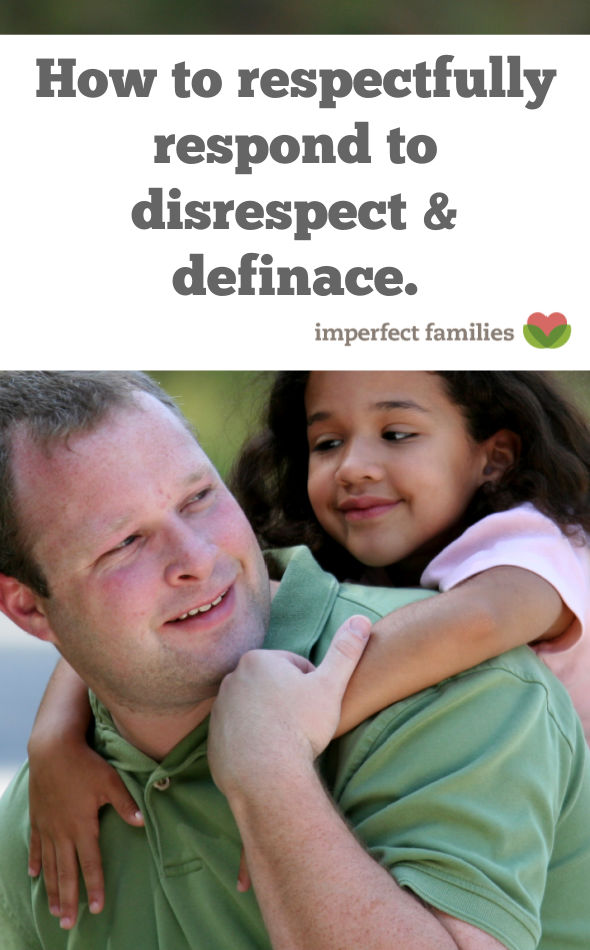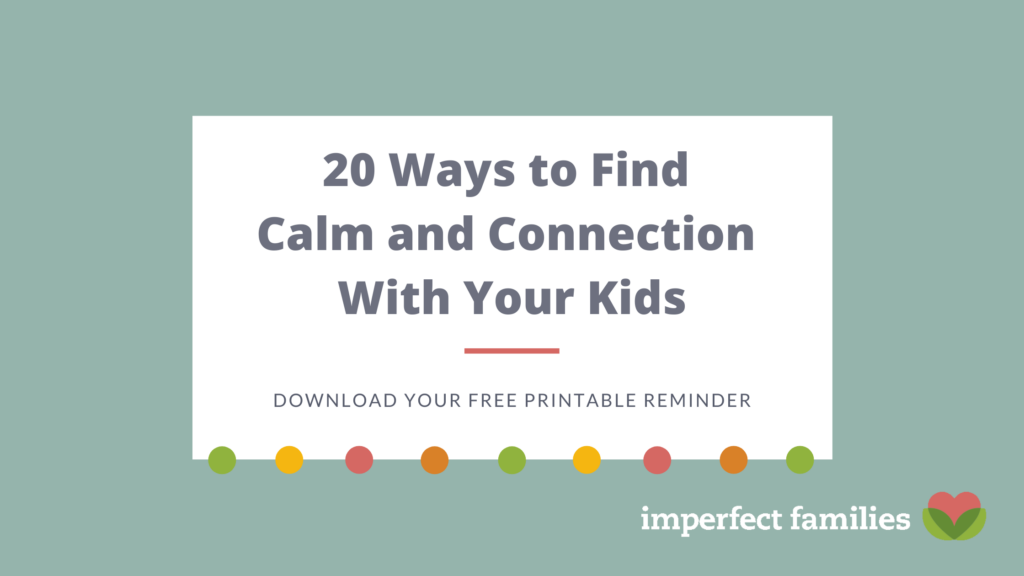Use this list of tips to address your child’s defiance and disrespect in a way that keeps the relationship strong.

“You can’t make me.” He stands defiantly, arms crossed.
In the past, you may have yelled, “How dare you talk to me like that young man, get to your room!”
And when he refused, you would have added, “And no more video games this week!”
(It would have gone badly. Lots of yelling. Use of force. Maybe some tears.)
But, you are trying to parent differently now. Trying to add some respectful parenting strategies and prioritizing the relationship with your child.
In moments like this, you wonder if this type of parenting even works.
In moments like this, you feel powerless and overwhelmed. Unsure what to do next.
You are not alone!
We are all navigating tricky situations with our kids. We’re all trying to figure out what works and what makes things worse. We’re all trying to parent in a way that makes us feel good about ourselves at the end of the day.
Disrespect and defiance are some of the most difficult things we will face as parents.
I want to give you plenty of strategies to try and I encourage you to mix and match to fit your needs and the needs of your child.
Be patient with yourself in this process. You and your child are learning a new way of interacting, and it may take time before it becomes a healthy habit.
How to respectfully respond to your child’s disrespect and defiance
It starts with you. Before we can help our kids manage their big feelings, we need to learn how to manage our own. Notice when you’re being triggered and explore ways to calm your own fight, flight, freeze response by meeting with a Mental Health Professional or a trusted friend.
Rephrase the behavior. How you define your child makes a difference. Even the words “defiant” and “disrespectful” color how you see your child, labeling them as a “bad kid” with “malicious intent.” Instead try: “He’s having a hard time.” Or, “His emotions are too big for him to manage right now.” Or, “He does not have the skills to talk about this in a more respectful way.”
Pause. In the heat of the moment, we often feel compelled to act. Instead, stop. Do not engage. Think about your next move and ask: “Will this help?” and “What do I want to teach my child?” or “How can I model the behavior I want them to use with me?”
Take a deep breath. You cannot use calm, confident parenting strategies if you are matching your child’s intensity. Instead, wait until your brain has returned to calm before moving forward. And, wait until your child’s brain is calm before you try to teach a lesson.
Talk less. Trying to have a discussion with an upset child will usually result in a battle. Instead, save the conversation for later. Resist the urge to use logic or reasoning, consequences or punishments when everyone is upset.
See your child. Listen to their complaints and frustrations with the intent to understand. Big feelings often come out in big, yucky words. They are often accompanied by aggression, yelling, and crying.
Be empathetic. Acknowledge their perspective, even if you do not agree. Try to put their feelings into a sentence, “You are disappointed.” Resist the urge to add “…but, I told you it might not work out.”
Set boundaries. Safety is a priority and it is OK to state limits around what is acceptable in your home. “We do not use that language in our family.” Or, “I am going to stand between you and your sister so that no one gets hurt.”
Have thick skin. Everything your child does or says needs a response. Rather than reacting, let some things bounce off. You can talk about these statements later, but in the moment remind yourself that you are a good parent and your child is having a hard time.
Soften. In tense moments, we often see our child as an enemy, rather than someone we love. Rather than stiffening and standing in a defensive pose, open your arms. Sit down nearby. Say, “I hear you. This is a lot. We will get through this. We can work it out. I’m here.”
Practice disagreeing. Your child may not know how to express their opinion in a respectful way. Talk about tricky situations and role-play conversations together. Switch roles, and leave room for silliness and laughter.
Don’t assume. Sometimes, our kids just need a space to vent, to talk about their frustrations and irritations without interruption. Rather than assuming, ask “Do you want to hear my thoughts or do you just want me to listen? Or, “Would you like my ideas for working this out?”
Brainstorm. Once the dust settles, see if you can problem-solve together, finding ways to work through these difficult situations respectfully. Phrases such as, “I wonder…” and “Do you have any ideas…” open up the conversation.
Connect. Kids are longing to be seen and known by their caregivers. Create an intentional habit that prioritizes one-on-one connection with your child throughout the day.
Be curious. Behavior is often a symptom of a deeper need, a lacking skill, or a disconnect. Ask yourself “Why is this behavior occurring?” Or, “What makes today harder than other days?” Or, “What need is my child trying to meet through this behavior?”
Backtrack. Slow down and think about what led up to this moment. Where did things get off track? What environmental, sensory, mental health, and physical factors impact your child’s behavior? Are there skills that are still in development? How did your behavior play a role?
Notice the good. Watch your nice-to-nag ratio. Point out times when your child is doing something well, when they are making an effort, when they interrupted an old habit with a new skill. Don’t wait for perfect, praise the process!
Use humor. Disrespectful and defiant behavior is concerning, but taking it too seriously can put a wedge between us and our kids. Being silly and playful can lighten the mood and keep the relationship strong. It also sends the message to our kids, “I love you, even in these tough moments.”
Do over. If all else fails, acknowledge that things didn’t go well and plan to do better next time. We are all imperfect. None of us will handle these situations well 100% of the time. Learn what you can from difficult interactions, make a plan for next time, and be kind to yourself!
You decide to try something new:
“You’re right, I can’t make you. And I don’t want you to feel like I’m forcing you. That doesn’t feel good at all, huh?”
He seems less defensive now, so you continue, “I know this is not what you would choose to do today. I get it. It’s not my favorite either.”
Taking a deep breath, you move in for a hug. He doesn’t resist. “OK. We’re in this together, how are we going to get through this thing we don’t really want to do?”
He’s not thrilled, but he’s not yelling. You feel more calm and confident. And that’s a step in the right direction.
If you try these strategies and still feel stuck, reach out to a mental health professional or meet with me for an online parent coaching session. Sometimes, we need more support in order to support our kids. And sometimes, our kids need more support than we are able to provide. There is no shame in seeking extra help!



Comments have been turned off to retain the privacy of all families. If you have a question or comment on the topic, you're always welcome to contact me.